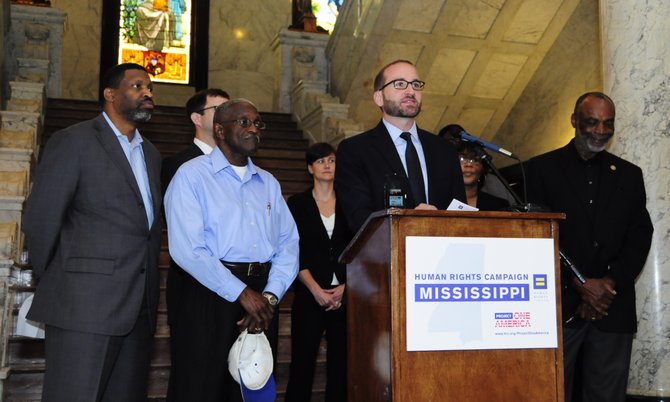Chad Griffin, president of the Human Rights Campaign and at the microphone, is a southerner and hopes to bring equality to Mississippi and other southern states. Photo by Trip Burns.
Editor's note: On May 21, Waveland became the seventh Mississippi city to pass diversity resolution recognizing the role LGBT people play in thriving communities. Last week, the Jackson Free Press spoke with Human Rights Campaign Director Chad Griffin about the importance of such resolutions.
On a stop of his tour through the South, Human Rights Campaign President Chad Griffin spoke at the Mississippi Capitol in Jackson on May 13 about the Human Rights Campaign's newest permanent campaign, Project One America.
The project is the largest coordinated campaign for LGBT equality in the history of the South with a three-year budget of $8.5 million and a staff of 20.
During the press conference, Griffin said that as a part of Project One America, Mississippians could expect to see more pro-LGBT resolutions passed in towns around the state and more anti-discrimination legislation proposed. He explained that in order to change the lived experience for the LGBT community, Project One America would ensure more conversation on the community level, including with religious leaders, Democrats and Republicans.
Griffin, an Arkansas native, took a few minutes after the press conference to talk to Jackson Free Press about the state's current support of HRC and what Mississippians can expect to see as the project moves forward.
Has there been any decision on where the facility for Project One America will be?
No, there hasn't been a decision, other than the decision that the offices will open very soon here in Jackson. In terms of location, we'll have an announcement in weeks to come—staff as well as location.
Where did the idea for Project One America originally come from?
You know it came out of, quite frankly, our members and supporters who live in these places. We have been hearing the demands for this work for a long time. One third of our membership reside in the South. We have over 1.5 million members and supporters—500,000 of those live in the Deep South, including thousands here in Mississippi, Arkansas and Alabama.
After that historic (U.S.) Supreme Court decision last June (overturning the Defense of Marriage Act), it became very clear to our team that we had set up the scenario of two Americas—the haves and the have-nots when it comes to equality.
What was clear as our goal, as the largest national LGBT civil rights organization, is singular—it is to close that gap. And there is no more important place to close that gap than these three states.
Las-Vegas based casinos, such as the Beau Rivage in Biloxi, have been recognized as LGBT-friendly workplaces; however, there has yet to be a response from casino officials about the recently passed legislation, SB 2681. How do you feel about the level of participation of Mississippi's Las Vegas-based casinos in regard to SB 2681?
I would just speak about that in general terms because this is not something that is unique to Mississippi. It's something that we've actually seen across the country. Probably the most high-profile example is what happened in Arizona where Jan Brewer ultimately vetoed a similar bill. And Jan Brewer, who is not seen as the most progressive of governors, vetoed that for reasons of business.
She vetoed that because virtually every business in that state and around the country said, "we won't do business in your state if you sign this. We won't bring our conventions to your state, we won't bring our Superbowl to your state if you do this." And she vetoed it.
That's how we've made progress on these issues around the country, and I am confident that with the work in this state, we will increasingly build more and more business support so that we can prevent these things in the future and, quite frankly, roll back some of the harm that's already gone forward.
How has the response been from state officials thus far, and do you expect to gain more support?
We will gain more support. Look, if you just look at this issue from a state level as well as a national level, we have seen every day more and more Democrats and Republicans joining the side of liberty, freedom and equality, which, by the way, is the most conservative of values. So I am confident, and I am optimistic, because of experience in other states and some in this state, that we will build upon the support that already exists here. There is already a lot of public support. You saw three of them (State Reps. Jim Evans, Rufus Straughter and Alyce Clarke, as well as state NAACP President Derrick Johnson) standing with us. There is more support that might be more quiet and in private. Our goal is to bring that support out and convince those that are not yet with us to join us. That's our job.
Read more about the group's efforts at http://www.hrc.org/states/Mississippi.


